
(NOT SPOILER FREE) tori (they/them). CEO of father backstory since 2015 || twitter: @kanotototori || meta: #my meta (V3)
999 posts
Another Random Manga Page. Well, Its Not Actually Random, It Just Lacks Context. For Now

Another random manga page. Well, it’s not actually random, it just lacks context. For now
-
 coolstoneguy liked this · 4 years ago
coolstoneguy liked this · 4 years ago -
 0littleghost0 reblogged this · 4 years ago
0littleghost0 reblogged this · 4 years ago -
 harusphotos liked this · 4 years ago
harusphotos liked this · 4 years ago -
 tututulip liked this · 4 years ago
tututulip liked this · 4 years ago -
 cassalice-blog liked this · 4 years ago
cassalice-blog liked this · 4 years ago -
 tremendouscloudpandapatrol liked this · 4 years ago
tremendouscloudpandapatrol liked this · 4 years ago -
 netamoonshark reblogged this · 4 years ago
netamoonshark reblogged this · 4 years ago -
 netamoonshark liked this · 4 years ago
netamoonshark liked this · 4 years ago -
 namiswand liked this · 4 years ago
namiswand liked this · 4 years ago -
 savage2018 liked this · 4 years ago
savage2018 liked this · 4 years ago -
 gracethedgraymaniac liked this · 4 years ago
gracethedgraymaniac liked this · 4 years ago -
 togadayana13 liked this · 4 years ago
togadayana13 liked this · 4 years ago -
 daiavocado liked this · 4 years ago
daiavocado liked this · 4 years ago -
 acissej-is-eman-ym liked this · 4 years ago
acissej-is-eman-ym liked this · 4 years ago -
 captain-noggles liked this · 4 years ago
captain-noggles liked this · 4 years ago -
 lenalena009 liked this · 4 years ago
lenalena009 liked this · 4 years ago -
 unfortunatemizeria liked this · 4 years ago
unfortunatemizeria liked this · 4 years ago -
 notbabycupid liked this · 4 years ago
notbabycupid liked this · 4 years ago -
 royaldragonsevgisi15 liked this · 4 years ago
royaldragonsevgisi15 liked this · 4 years ago -
 applejarjar liked this · 4 years ago
applejarjar liked this · 4 years ago -
 yassichans-blog liked this · 4 years ago
yassichans-blog liked this · 4 years ago -
 nashetanya liked this · 4 years ago
nashetanya liked this · 4 years ago -
 patthy2020 liked this · 4 years ago
patthy2020 liked this · 4 years ago -
 tainalen liked this · 4 years ago
tainalen liked this · 4 years ago -
 noragamiartau reblogged this · 4 years ago
noragamiartau reblogged this · 4 years ago -
 haruwashere29 liked this · 4 years ago
haruwashere29 liked this · 4 years ago -
 invertedgoogle liked this · 4 years ago
invertedgoogle liked this · 4 years ago -
 jaybaebae69 liked this · 4 years ago
jaybaebae69 liked this · 4 years ago -
 chin-chann liked this · 4 years ago
chin-chann liked this · 4 years ago -
 kurokoucha liked this · 4 years ago
kurokoucha liked this · 4 years ago -
 annoyingkidblizzard liked this · 4 years ago
annoyingkidblizzard liked this · 4 years ago -
 kanotototori reblogged this · 4 years ago
kanotototori reblogged this · 4 years ago -
 kanotototori liked this · 4 years ago
kanotototori liked this · 4 years ago -
 bluemillie liked this · 4 years ago
bluemillie liked this · 4 years ago -
 kinpaheaju liked this · 4 years ago
kinpaheaju liked this · 4 years ago -
 lazydaos liked this · 4 years ago
lazydaos liked this · 4 years ago -
 shinkimiope liked this · 4 years ago
shinkimiope liked this · 4 years ago -
 jayjayjay719 liked this · 4 years ago
jayjayjay719 liked this · 4 years ago -
 aanlexx liked this · 4 years ago
aanlexx liked this · 4 years ago -
 herstrayskies reblogged this · 4 years ago
herstrayskies reblogged this · 4 years ago -
 strayskies liked this · 4 years ago
strayskies liked this · 4 years ago
More Posts from Kanotototori
Father: true desires, projection theory, and related thoughts (Part 1-2)
[Part 1-1] [Part 1-2 here]

Continued from Part 1-1.
➞ Yato’s divine nature
"There seems to be no absolutely evil deities in Japan.”
As echodrops pointed out in her short segment about this concept, all other gods we’ve seen so far seem to adhere to their divine natures: Tenjin, as a god of learning, is a scholar, Bishamon is a warrior god who stays focused on combat, Kofuku - as a god of poverty - brings bad luck wherever she goes, no matter what she may do to hide her bad luck as binbougami. So why is it that Yato seems to be the only exception here, the god of calamity who has not a single malicious bone in his body, as we can see in the Sakura flashbacks?
There can be two answers to this: (A) Yato is not the product of Father’s wish at all but another god entirely, per the Tsukuyomi or Susanoo theories, which I reject; or (B) that Yato is the product of Father’s wish but not specifically “cull the herd”, which is his superficial desire for revenge. I’ve laid the groundwork to talk about option B.
If Yato is not the product of a malicious desire, then what kind of desire is he a product of, exactly?
To answer that question, we need to look at one particular aspect of Yato’s main inner driving force in his childhood. That main force is this: making people happy.
This is said as early as the Yomi arc, when Yato meets up with Ebisu in the Underworld:

(Chapter 31)
And indeed, this seems to be a primary motivation for Yato. It permeates the entirety of the Sakura flashbacks, in which we see baby Yato acting most freely on his instincts.


(Chapter 46)

(Chapter 47)
Even when Yato was killing for Father, it wasn't because he derived any joy from the act of killing itself (besides killing being his way of "playing"), but from making Father happy. The first thing we see Yato do after his first successful “play” session is to run to Father, asking whether he'd seen what they've done, looking for his praise.

(Chapter 46)
Of course, this could also be chalked up to: (A) Yato still being a small god, a child, so his intentions are more "pure" and he is acting as a child would, seeking his parent’s love and praise, or (B) Father wanted to have this kind of subservient god at his beck and call to take his anger out on, reversing the power dynamic of the god-human relationship. I don't think either of those two statements are quite correct - there is another prominent aspect to Yato besides his motivations to make people happy:
The concern for humanity and their wishes.
The purpose of any god, of course, is to hear people's wishes and prayers because they are a product of those wishes and need them to survive. But the gods' effectiveness in answering these prayers is very questionable, from Father's point of view: no matter how much people pray, those prayers go largely unanswered, and are therefore worthless.

(Chapter 87)
When we are shown the gods’ work towards protecting humanity and answering wishes, the bulk of it is slaying ayakashi, which is mostly preventative work (important but ultimately passive and uninvolved). And when we did see active work being put into granting wishes (wishes within the realm of a god’s ability, since they don’t seem to have much control over wishes like “let me pass my exam!” and the such) through Tenjin entrusting Yato with returning Mayu’s daughter’s pocket watch chain to Mayu, he remarks that even though she’s been worshiping at this shrine for so long (implied to be almost her entire life, as she came here with Mayu as a child and kept coming back as an old woman), it took him that long to notice her wish. This is a milder example of the kind of neglect Father talks of.



(Chapter 43)
And Yato seems to be the antithesis of this kind of neglect. The very first thing we see baby Yato say on-screen, even before Sakura is “Is that a prayer?” in response to someone’s plea for help…

(Chapter 45)
...And later, when he does meet Sakura, it’s noted that he’s always wanted to say that someone’s wish has been heard loud and clear. (The unofficial scans I’m looking at say he “wanted to try speaking” but the official says he always wanted to say that line in Chapter 46).
Of course, Yato isn’t a famous god like Tenjin who gets tons and tons of wishes, most of them probably impossible to truly grant. Yato is not overwhelmed by prayers and can’t afford to be picky about listening to them. Again, these instances could very well be chalked up to a god’s reliance on prayers to survive instead of being the result of Father’s “true desire” beyond “cull the herd.”
However.
In Chapter 61, in the scene with Bishamon following immediately after Father’s Chapter 60 speech, Nana says this:

(The official translation reads: “I wouldn’t be surprised if Heaven took someone he loved, like it didn’t even matter. [...] Sometimes, Heaven takes too much.”)
In Chapter 60, Father states that people just put up with whatever the gods do “no matter how much they take from [people]”; in Chapter 70, Father (in Yato’s mind, anyway) questions “how many have been caught in the crossfire of the [gods’] conceit”, showing, again, how little care gods can have for human lives;

In Chapter 87 (appropriately named “The Way to Darkness”), Nora questions whether Hiyori would be able to forgive it if Yukine died at the hands of a god and that calamity bears a face in this world, too, which is why Father can’t forgive it.


In Father’s perspective, gods take lives and think nothing of it. But in the previous two pages before Nora says what she does…


“At some point, Yato started mourning the death of other people. It’s silly for a god of calamity but that boy loved people.”
Yato mourned the death of the people he killed. If people’s deaths mattered to the gods like they mattered to Yato, would Father’s beloved person have died in the first place? If all gods cared for people as Yato cares for people, would the system Father so loathes be as destructive as it is?
I believe this is the heart of Father’s original desire, the “one wish he’s been able to wish in his entire life”: a world where people are not as rotten as Father now perceives them to be and gods are as dedicated to the well-being of humanity as they are supposed to be.
(There’s a really interesting comparison to be made here between Father and Yukine, especially with recent developments in regards to Yukine - Yukine believes people to be inherently good while Father believes them to be inherently bad, yet Yukine’s desire for a world where people are kind to each other and his thoughts on the judgement of gods may mirror Father’s own in a less cynical time. I’ll expand more on this in Part 2.)
Now, I’m not saying that Father’s wish is not “cull the herd.” This is 100% obviously his wish when we see him in the Sakura flashbacks - even Yato instinctively knows this to be true.

But this wish came from somewhere and wasn’t always about the culling of humanity and the disappearance of the gods - Father’s desire of a better world as the “only wish he’s been able to wish his entire life” became increasingly distorted and twisted as Father became more disillusioned with the world.
Father is absolutely hellbent on Yato being a god of calamity, a “god who can only take.” (Remember quote 2? “There seems to be no absolutely evil deities in Japan.” All deities have an orderly nigi- aspect and a disorderly ara- aspect). It irks Father to no end that Yato is a god that embodies the things that he does, not Father’s superficial and unrealistic desire for revenge - he’s the antithesis of everything Father has become over the years.
The thing about Father is that he’s completely progressed past the belief that things could change, or in the goodness of the world or of humanity. Father doesn’t want healing or goodwill - the things Yato represents - he wants revenge; there is no hope for the system, so the only thing to do is smash it, not try to fix it. This manifests in Father’s quite blatant, almost obsessive desire to not only beat Yato down and make him hurt but also the general impulse to “corrupt” everything that is good and hopeful.
Which brings me to my next point: Part 2, the Projection theory.
(Coming soon to my blog near you!)

Cursed Noragami emojis for all your cursed Noragami emoji needs <3

"Hey, Yuuki! You listening, Yuuki!?! Catch him."
Noragami Chapter 93.2 - Objective



I KNEW IT. I KNEW SOMETHING ELSE WAS GOING ON WITH ALL THIS CAMELLIA SYMBOLISM. FUCK!!!!
Noragami Analysis: Ebisu vs Takemikazuchi
Hello, it’s been a while since I’ve written Noragami essays, and I’m back with another one that absolutely nobody has asked for: Ebisu and Takemikazuchi. This one will be a bit less organised and less detailed than my usual, but I thought it would be fun to pick apart some of their similarities and differences. It’s interesting to see how their relationship has changed from Take being outright antagonistic towards adult Ebisu, to the funnier, humorous interactions that we’ve been seeing more of in the recent chapters.

This scene below is the first time the main cast gets to meet Take, which is when he meets the new Ebisu at Kamuhakari.

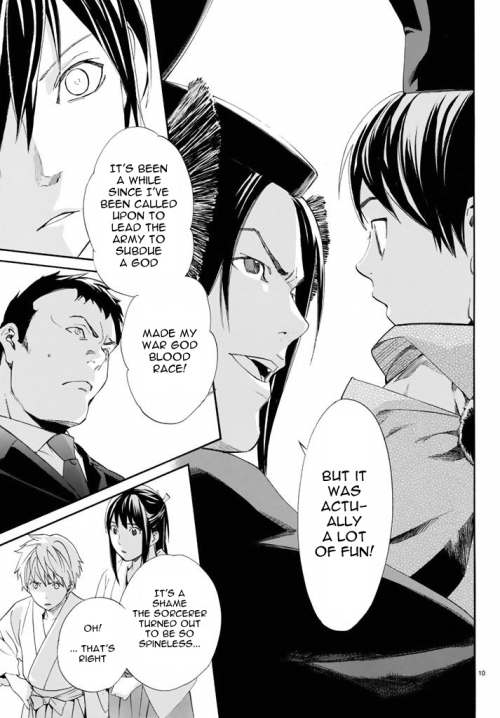
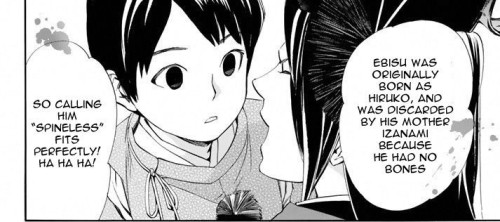
With some hindsight now that we know Take’s backstory, we can see some parallels from their first exchange alone. Take mocks Ebisu for what his previous incarnation supposedly did. Where else have we seen this happen?
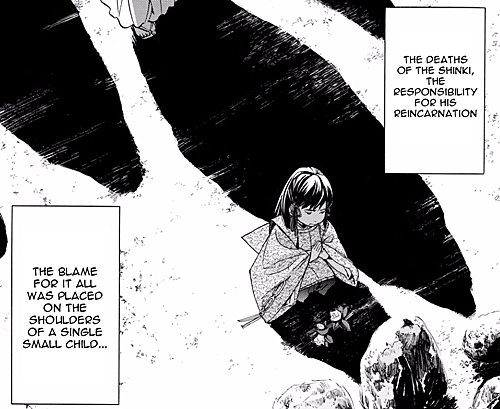
Take quite similar to a schoolyard bully who has their own problems at home, taking it out on others. Adding onto that, there’s the issue of their reincarnation that speaks to Heaven’s corruption.
Ebisu’s constant reincarnations aren’t much of a secret to Takamagahara, but reincarnation, much like death, it’s treated as a taboo topic. This taboo has been seen in Bishamon’s household early on in the manga, and followed up on with Take’s backstory arc.


These make Heaven’s hypocrisy all the more glaring. Takemikazuchi’s household is literally built on cover-ups of the grisly circumstances of his reincarnation, but it’s Ebisu’s reincarnating that ends up in the spotlight.
Politics
Both Ebisu and Take are different archetypes of gods in Heaven. Both are very prominent gods, but Take represents the ‘proper’, orthodox way Heaven does things. Before Amaterasu made her grand appearance, he was virtually representative of Heaven itself. The scene pans to him whenever the heavens act.

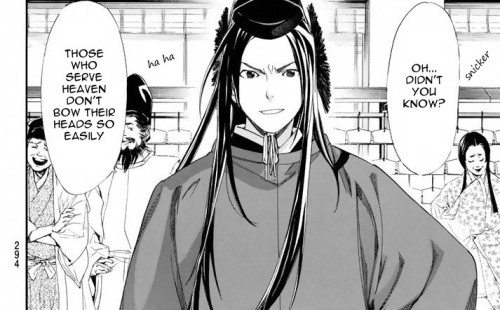

In his very first appearance, we aren’t even shown Take’s face, which he hides behind an anonymous screen at the Kamuhakari and the white covering during Ebisu’s subjugation. His first appearance without a covering on is asking Yato if he swore loyalty to the Heavens, making it appear as though he’s the main representative of Amaterasu herself (albeit asking through Kiun, which adds extra Shady Points).
The main villains of Noragami initially have “heralds” who act on their behalf before the real villain appears. For example, we knew about Father early on in the series, but he’s not the one we see: it’s Nora/Mizuchi/Hiiro who does the work and manipulation for him before we even know what he looks like. The corrupt system of the Heavens is Noragami’s other antagonist, and Takemikazuchi is that ‘herald’ to Heaven’s corruption, just like Nora. Take shares this kind of arc with Ebisu as well, who was initially set up to appear as the story’s villain. It’s interesting how once we’ve gotten to know these characters on their own, they’ve been gradually distanced from the “Heaven Bad” group of gods.
In terms of politics, Ebisu is notorious for being unconventional. He keeps strays, tames ayakashi and takes down spells from a nation the Heavens tried to wipe out, despite the taboos associated with them. In one of the bonus chapters he doesn’t blink an eye at the absurdity of a human girl finding her way to Takamagahara.
Even at the Divine Council meeting, Ebisu’s stances can be described as liberal compared to the other gods.

And who shuts him down for it? None other than good old Take. Take makes a big deal about being in Heaven’s good graces, looks down on “false gods” and in general acts with the pompousness of being one of the most powerful gods in Japan. Even up till the recent chapters, Take seems to align himself with the Heavens… up until he’s faced with the prospect that Heaven now considers him a threat.

Now that Take’s been cut away from Heaven, he’s been upgraded from a reluctant tagalong to a slightly more enthusiastic part of the group. It’s been a rocky transition, sure, but we’ll have to see where it leads.
Guideposts and Upbringing
As I’ve brought up in my Ebisu-Iwami post, Noragami has a very unique kind of relationship dynamic, which is shinki raising their newly reincarnated gods, which we’ve seen in Ebisu and Takemikazuchi (and Arahabaki too, but there’s not enough material at the moment to include him at the moment).
And as with many things, balance is key. Being too “active” in making important decisions for a god veers into “appropriating” them (think helicopter parenting), and being too “passive” makes them feel neglected.
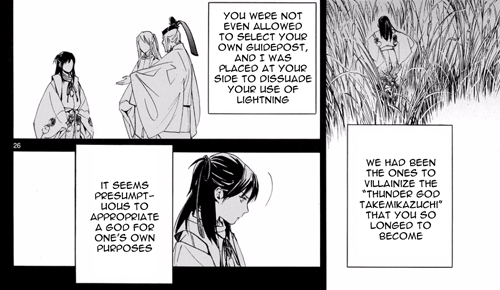
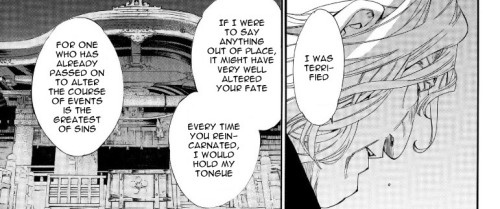
I’ve made a separate post here on how inactive Iwami sometimes is with Ebisu to the point that both of them suffer from its effects, and @echodrops has written a fantastic essay on Take’s overbearing shinki as well. The details are much longer than I can discuss here, but those are stuff you can read if you’re interested in this shinki-god dynamic.
Respect for self and shinki
Both of Ebi and Take have a similar recklessness when it comes to their personal safety, albeit for different reasons. Take throws himself into danger and actively provokes others into becoming his enemies so he can attain a hafuri, solid proof of his shinki’s loyalty and ability.
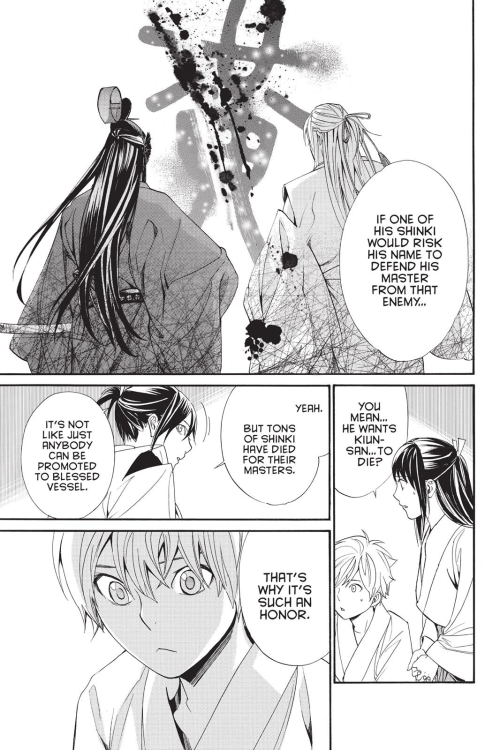
Ebisu, while not as callous as Take, has tried some less-than-thoughtful ways of gauging his shinki’s loyalty. Both of them are insecure about how much their shinki really care for them and seek assurance for it. This of course does cause a rift between their current guideposts and themselves, but over the course of Noragami’s progress, both Kiun and Kunimi have gotten the chance to be closer to their masters and affirm their bond, and now we see more personal concern going on between the gods and their shinki.
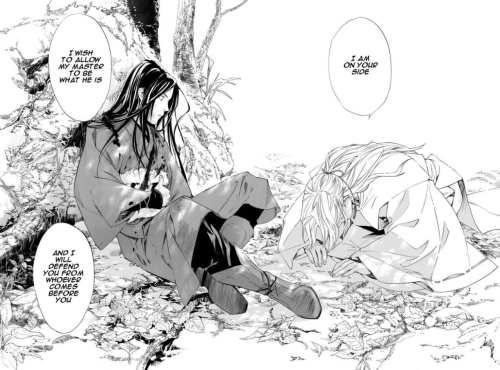
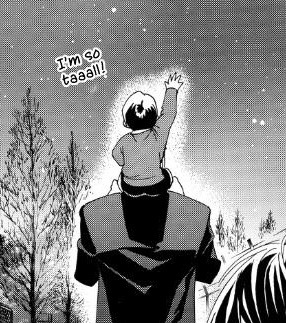
I thought it would be nice to end it here with a bookend to that first scene.
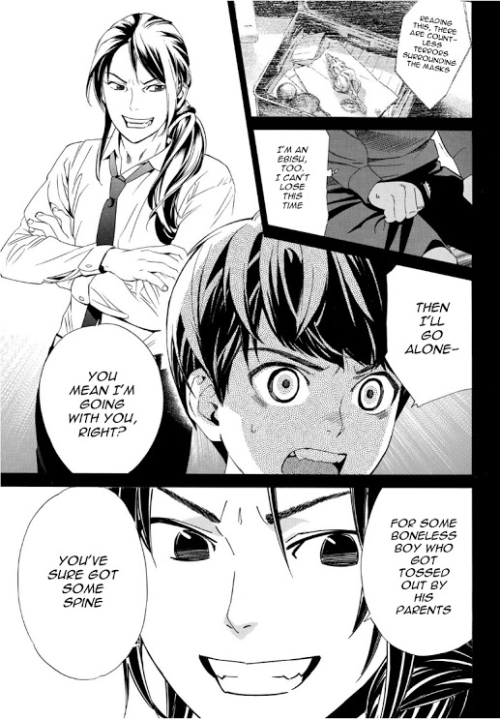
I’m happy to see them each developing as characters and building a much friendlier dynamic with each other. Here’s to more hilarious Ebi-Take interactions in the future.
*
If you liked this, you can check out other essays I’ve written for Noragami:
That one set of artworks by Adachitoka (a set of three artworks featuring Noragami characters with different kinds of plants: some stuff about the meanings of said plants)
Noragami Theme Analysis: Ebisu and Crying
Noragami Analysis: Ebisu and Iwami
Noragami Chapter 73/Theme Analysis: Ebisu and Kunimi, Part 1
Noragami Chapter 73/Theme Analysis: Ebisu and Kunimi, Part 2